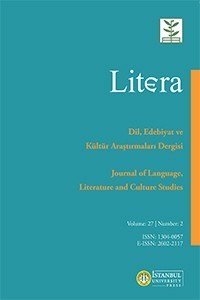The Pleasure of the Text: An Aesthetic Experience for the Reader
The notion of pleasure has often been the source of debates and aporetic positions both in critical reflections and in the philosophy of art. However, to evoke the notion of pleasure in a reading process implies essentially to highlight the triadic relation author – text – reader. However, the subject/reader could have a feeling of pleasure in front of a text without thinking about its author, the only entity that can be actualized now remains the literary text. It is in fact a «much more intellectual pleasure» (Barthes, 1973, p. 11), which places it in a critical and aesthetic dimension. If we take pleasure in a euphoric sense, it would therefore be a feeling that is related to the affect, then the latter from this point of view is nothing other than the reconciliation of the sensitive (reader) and the intelligible of the literary text. Reconciliation that passes through a look, an attitude, facing this «lazy machine» (Eco,1985, p. 34) that the aesthetic experience actualizes. This work will examine closely the role of the subject/reader in reading before landing on the notions of pleasure, experience, and the aesthetic dimension that underlies them. Starting from the premise that pleasure is an aesthetic experience of the reader, It is fitting i logic to question the notion of pleasure in an aesthetic dimension; as an experience of the reader, ask to what extent pleasure is a form of intentionality of the subject/reader. The study will examine the parodic references and the ironic discrepancies in some passages of Brothers Karamazov of Dostoyevsky and The part of the son of Jean-Luc Coatalem.
Keywords:
Pleasure, aesthetics, experience, reading reader,
___
- Barthes, R. (1973). Le plaisir du texte. Paris : Seuil. google scholar
- Coatalem, J-L. (2019). La part du fils. Paris : Stock. google scholar
- Compagnon, A. (1998). Le demon de la theorie. Paris : Seuil. google scholar
- Doguet, J. (2007). L’art comme communication. Paris : Armand Colin. google scholar
- Dostoıevski, F. (1881). Les freres Karamazov. Domaine public : libre. google scholar
- Eco, U. (1985). Lector in fabula. Paris : Grasset. google scholar
- Eco, U. (2002). De la litterature. Paris : Grasset. google scholar
- Freijomil, G. (2009). Les pratiques de la lecture chez Michel de Certeau. Les Cahiers du Centre de Recherches Historiques. URL: http://journals.openedition.org/ccrh/3533; DOI: 10.4000/ccrh.3533, consulte le 21/12/2020 google scholar
- Genette, G. (1997). L'ceuvre d'art. La relation esthetique. Paris : Seuil. google scholar
- Gilli, Y. (1983). Le texte et sa lecture. Une analyse de l’acte de lire selon W. Iser. Semen. URL: http://journals. openedition.org/semen/4261, consulte le 02/02/19. google scholar
- Kant, E. (2015). Critique de la faculte de juger, Trad. Alain Renaut. Paris : Flammarion. google scholar
- Mannoni, P. (2016). Les representations sociales. Paris : PUF. google scholar
- Mardaga, P. (1997). Wolfgang Iser. L’acte de lecture : theorie de l’effet esthetique. URL: https://books.google. co.ma/books. Consulte le 22/12/20. google scholar
- Rastier, F. (1991). Semantique et recherches cognitives. Paris : PUF. google scholar
- Schaeffer, J-M. (2015). L’experience esthetique. Paris : Gallimard. google scholar
- Therien, G. (2007). Theorie de lecture litteraire. Quebec : PUQ. google scholar
- Başlangıç: 1954
- Yayıncı: İstanbul Üniversitesi
